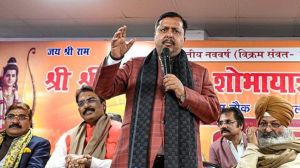Ban VVIP movement
Howacirc;euro;trade;s this for a suggestion? Gujarat would be better of if VVIPs of all hues remained where they are and monitored the ...

Howacirc;euro;trade;s this for a suggestion? Gujarat would be better of if VVIPs of all hues remained where they are and monitored the progress of relief operations over the telephone. This business of visiting the devastated areas in helicopters and white ambassador cars with red lights may or may not further their public appeal but it certainly is not helping the situation on the ground. Reports have come in that key personnel who should have been employed in coordinating relief and communications in Bhuj were busy attending to the prime minister8217;s visit on Tuesday. If this is indeed the case, then it is a great shame. Every facility in the devastated regions needs to be deployed for the one task at hand: saving as many lives as possible and reaching every possible succour to a people who are rapidly reaching the end of their physical, mental and emotional reserves.
In any case, there is very little to be gained from such visitations apart from their symbolic value, a show of solidarity and sympathy, a willingness to lend one8217;s ears to the experiences of some among the affected people. No new facts emerge during brief stopovers of this kind, no insights are there to be gleaned. As for the time-honoured practice of aerial surveys, they are not just a drag on finite resources, they provide a completely false notion of addressing a problem while being little more than an opportunity to make it to the nine o8217;clock news bulletin. Some may argue that political tourism of this kind is an important source of reassurance for the suffering populace, but going by the evidence at hand the stage for reassuring the quake-affected people of Gujarat is long past. There is desperation and despair out there and it needs well-mounted administrative interventions, not sympathy calls. Can we therefore call upon the prime minister, the home minister, the defence minister, the leader of theOpposition et al to show their concern by not taking wing but ensuring nevertheless that those appointed to do the job of supervising relief and rehabilitation measures are hard at work?
As it is, there have been monumental errors made in reaching timely relief to the worst-hit. As this newspaper reported, a French rescue team which had responded to the crisis with alacrity found that the logistic support on the ground 8212; something a well-administered rescue effort would have provided 8212; was just not available. Home minister L.K. Advani is on record for having observed that funds are not the problem, their management is. Similarly, it is not the lack of relief material and agencies that is the problem, their rational deployment is. The lack of coordination stems from an absence of a comprehensive plan, which would take into account not just the relief material and volunteers available but accurately map the affected areas and the various phases of relief work that are in progress in each region. It is only to be hoped that systems will work more efficiently in the days ahead than they have so far. In many ways, the Republic Day earthquake will prove to be one of the biggest challengesthat the Republic has ever had to face.
- 01
- 02
- 03
- 04
- 05































